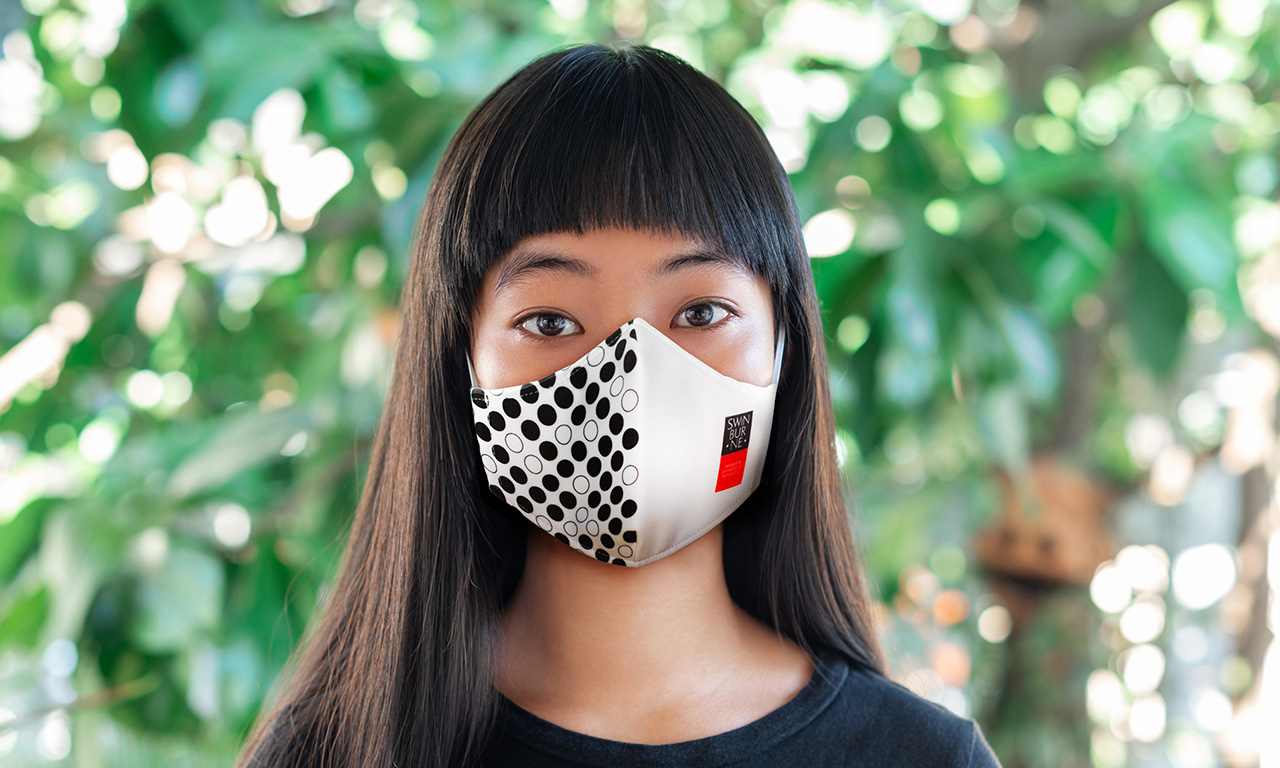Swinburne face masks designed to encourage social connection

The Swinburne face masks have been designed to draw the gaze to the visible parts of the face, based on research by senior lecturer in psychology, Dr Julian Oldmeadow.
In summary
- Swinburne has launched a range of premium quality, reusable face masks in campus-inspired designs
- Each purchase supports the Swinburne Student Emergency Fund
- The designs use Swinburne psychology research about the importance of separating the mask from the wearer to create positive perceptions
Swinburne has launched a range of premium, reusable face masks with campus-inspired designs.
Each purchase supports the Student Emergency Fund, which helps Swinburne students experiencing hardship from disasters beyond their control, such as the COVID-19 situation.
The special edition face masks are now available for online purchase. The masks, which meet official government and health specifications, are being sold in packs of three so they can be rotated and washed regularly.

Two of the designs are inspired by the façade of the Advanced Technologies Centre (ATC) at the Hawthorn campus, a Swinburne icon.
The psychology of face mask design
The face mask design elements are based on Swinburne psychology research about the importance of creating a positive perception of the wearer.
Psychology lecturer Dr Julian Oldmeadow, from the Social Psychology of Innovation Research Group, says the mandated use of face masks has sparked some fears that wearers could be perceived in undesirable ways.
“Faces are an incredibly important source of information about a person. They tell us a person’s emotional state, intentions and trustworthiness and are an important part of how we navigate the social world. When people wear masks, we lose a lot of important social information and tend to make assumptions, which are often negative,” he says.
The Swinburne face masks have been designed not only with a high level of protection, but to minimise the potential problems face masks may pose for social perception and cohesion.
“One way this was done was to create a design that evoked positive associations. Using recognisable designs, such as the ATC building on campus, communicates our shared Swinburne identity and creates an immediate, positive connection to the wearer,” says Dr Oldmeadow.
Dr Oldmeadow’s current research collaboration with Christoph Koch from the Centre for Design Innovation also informed certain design elements, such as the asymmetrical pattern, which helps to disrupt the tendency to perceptually merge the mask with the wearer, so our impressions of others would be based more on the visible parts of the face.
Face mask tips from an expert
Dean of Health Sciences, Professor Bruce Thompson says it is important to know the proper way to handle and wear face masks.
“It is important to realise the reason you are wearing a mask is mostly to protect someone from contracting the virus if you are a carrier and didn’t know it or preventing catching the virus from inhaled droplets or aerosol from someone who has the virus.
"You have to assume that the mask you are wearing may have virus on it after you have used it, so you have to be very careful handling the mask to not infect yourself or others.”

“My simple advice is to treat your masks like underwear,” says Professor Thompson.
“Yes, it sounds outrageous. But what I mean by that is: don’t touch them in public, don’t take them off in public, don’t put them on the kitchen bench, and definitely don’t give them to somebody else to wear. Don’t hang them up on your rear vision mirror in your car either, and once you take them off, you ideally put a new face mask on.”
The Swinburne face masks are now available for contact-free purchase and delivery via the Razor online store.
-
Media Enquiries
Related articles
-

- Astronomy
- Technology
- Health
- Science
- University
- Sustainability
- Engineering
Swinburne highly cited researchers reach the top in 12 fields
Ten Swinburne academics have been named on the Highly Cited Researchers 2025 list, released by Clarivate
Tuesday 02 December 2025 -

- University
Over 550 students don caps and gowns to graduate from Children’s University Swinburne
Over 550 students from 34 schools have graduated from Children’s University Swinburne, celebrating over 45,000 hours of learning beyond the classroom this year.
Wednesday 03 December 2025 -

- Technology
- Health
- Science
- University
$1.2m ARC funding to boost national X-ray spectroscopy capability through Swinburne and QUT partnership
Swinburne has secured $1.2 million in the latest Australian Research Council Linkage Infrastructure, Equipment and Facilities scheme round
Tuesday 02 December 2025 -

- University
Swinburne researchers shine at the 2025 Media and External Communications Recognition Awards
Swinburne’s 2025 Media and External Communications Recognition Awards have recognised our academics for notable media and social media outreach.
Thursday 04 December 2025 -

- University
Update on Union Street Windsor
An update from Swinburne University of Technology on the property at 131–133 Union Street, Windsor.
Friday 07 November 2025

